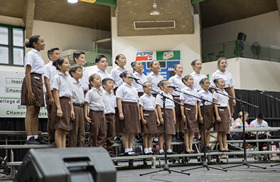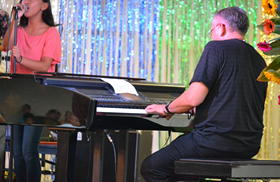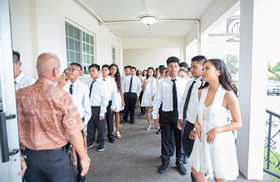Mount Carmel School educates and develops the complete Child. As an academy charter school we teach Morals, Values, and Culture, just as parents are able to teach the Virtues of right and wrong at home. Mount Carmel celebrates over sixty years of ensuring our children enjoy education rooted in Tradition, Spirit, Heritage, and Pride. We are community-based and MCS students are immediately more relevant and functional in their homes, villages, and communities. We enhance character and discipline while preparing our students for advanced education and the highest roles of responsibility in their lifetimes. MCS prepares students for lifelong learning and for excellence in family and community..
MCS proposes to continue to offer subject areas at levels and in a manner not currently offered in the public school or private school system. MCS will greatly enhance its current “activity-based curriculum” with a project-based curriculum (also known as “project-based learning/PBL”). MCS offers the most relevant and exciting project-based curriculum by utilizing the last sixteen (16) years of activity based learning to create a complete yet customized curriculum designed to most benefit local Guam students. While education in general has not changed over the last century, MCS evolved over the last sixteen (16) years resulting in an education more geared towards students from Guam. It is because of this proven success MCS further developed this complete conversion to project-based teaching and learning. The MCS model will not duplicate what other project-based schools across the world offer but instead offers to use the successful method with our proven additions resulting in a one of a kind project-based curriculum school (Pre-K through 8th grade).
MCS takes the standard project-based methodology and adds a number of key components to reaching our students. First, MCS adds the element of performance. Not only will students learn through working on projects, but each work assignment will include student performance (a minimum of “show and tell” and a maximum of live audience/broadcast). To add further incentive, and to better test proficiency, MCS will add, as it has for sixteen years, the element of competition. No competition is complete these days without rewards and recognition (younger students recognize this motivation as “prizes”). The last portion of this alternative, complete curriculum includes “review and improve.” Throughout each stage above in the MCS education, teachers, students, parents, and the general public will be given an opportunity to suggest improvements to the last project. The traditional projects remain dynamic. At the very end, students review their work and that of their peers to ensure both collective learning and proficiency. This method works best when targeted to the personal interest of each student, similar to families learning about science when cancer strikes a loved one or learning about finance when parents work with a bank to obtain their first home mortgage. The relevancy aspect continues from the beginning to the end.
MCS’ project-based curriculum (which includes all aspects listed above) includes the goal of creating critical thinkers not shy to raise their hands and offer alternative answers and solutions. MCS’ academic game of choice is chess which helps develop strategic and critical thinking. MCS will utilize the Socratic method of teaching in middle school, and will use this method when and where appropriate with elementary school students. The benefits of lively and engaged discussion are enormous and most especially for local students who oftentimes are shy (“mamalao”) to participate in class but do not hesitate at all to talk on the playground. At times successful engagement through this method becomes emotional when it becomes personal. If the responses and debates in class are on topics affecting students or about topics well known to students, the discussion and resulting learning are both exciting and effective. Students learn much about themselves using this method but also learn lots about their classmates, and the learning remains very interesting. All this leads to memory and experiences (knowledge) not forgotten. Learning to debate using logical arguments and accepting there is always someone who disagrees (which makes it more fun) leads to students growing up able to assume leadership roles not sidetracked by personal attacks or emotion. This method of in class learning leads students back to the goal of the collective benefit and bringing together those with differing views.












